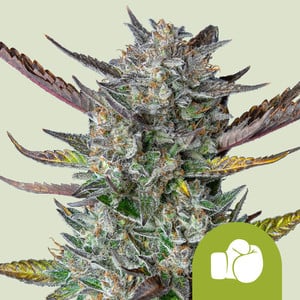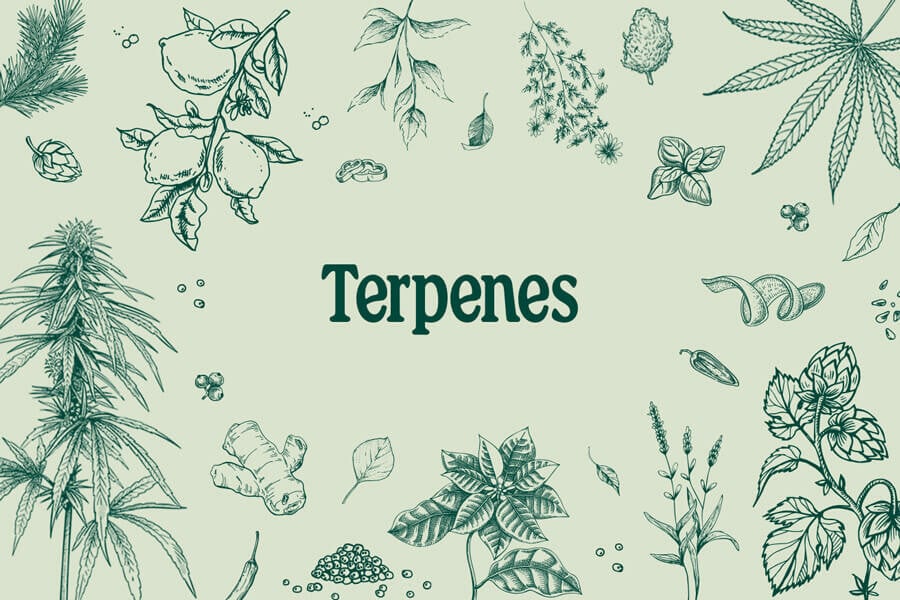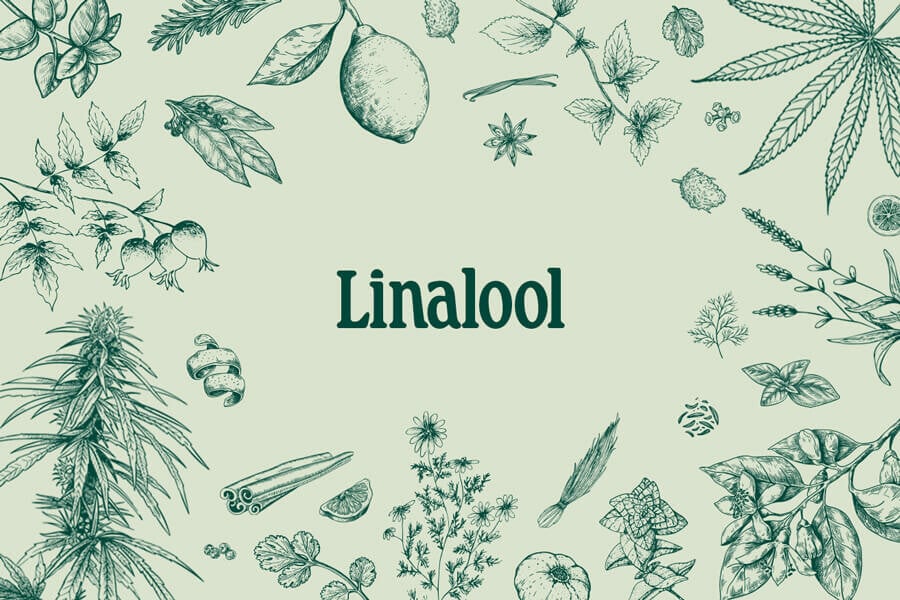.
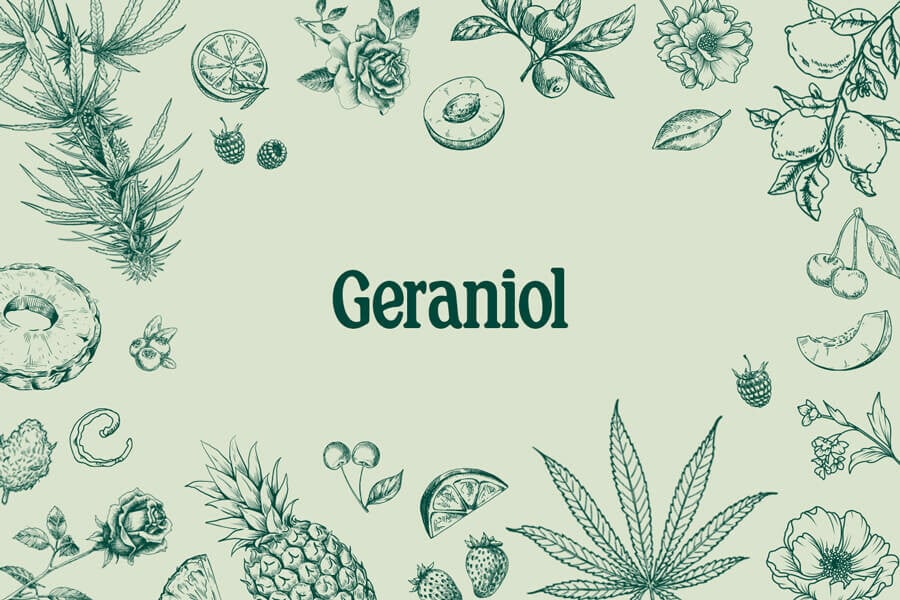
Geraniol: A Sweet, Floral Terpene With Plenty of Potential
Known for its sweet, citric, and fruity floral aroma, geraniol may have unique benefits, but do those effects extend to strains with a geraniol-rich terpene profile? Keep reading to find out what the science says about geraniol and what it might contribute to cannabis.
Contents:
Cannabis produces a massive variety of terpenes, which combine to create the plant’s distinctive aroma. Though not the biggest and most well-known name in the cannabis terpene lineup, geraniol has plenty of potential.
First and foremost, this tiny compound packs a big aroma that combines delicate floral notes with sweet, fruity, and citric overtones that have earned it an important place in the fragrance industry. You can find geraniol in the ingredients of deodorants, perfumes, cleaning agents, and countless cosmetics. Naturally present in some cannabis strains, it adds complexity and depth to their aromatic profiles.
Besides its aromatic appeal, geraniol may also have unique clinical potential. Given that it may also synergise with other cannabis compounds via the entourage effect, becoming familiar with the mechanisms and benefits of geraniol and other terpenes is key to better understanding cannabis’ wide spectrum of effects. Keep reading to learn all there is to know about the geraniol terpene and how it may affect our experience with this ancient plant.

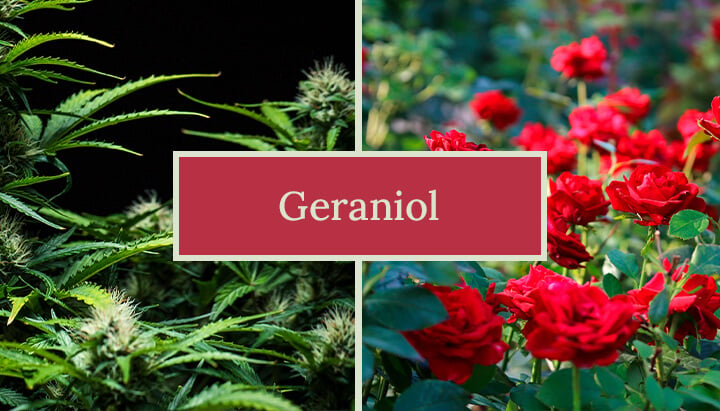
The Chemistry of Geraniol
Like myrcene, limonene, and linalool (other common cannabis terpenes), geraniol is a monoterpene—the smallest and most common type of terpenes found in cannabis. Unlike sesquiterpenes, monoterpenes have only two isoprene units. They also do not contain oxygen, unlike terpenoids.
Geraniol has a chemical structure of C₁₀H₁₈O and contains two prenyl units as well as one hydroxyl group. With a molecular mass of 154.253 g·mol−1 and a boiling point of 230°C, geraniol is a fairly volatile compound. Hence, its aromas are noticeable even at room temperature. You may, therefore, be able to pick up on its sweet, floral smell when your cannabis plants are still in bloom. Manipulating flowers in your hand may also help to bring geraniol’s delicate aroma to the foreground.
-
Sources of Geraniol
Geraniol was first isolated in 1871 from the essential oil of geranium grass (Andropogon schoenanthus), though it can also be found in varying concentrations in lavender, lemongrass, and the essential oils of ginger, lemon, lime, rose, orange, and nutmeg. Today, it is commonly used in the fragrance industry to make essential oil blends, fragrances, and flavours. It is one of the main ingredients of citronella, and geraniol is also secreted by honeybees in a scent they use to mark nectar-bearing fruit as well as the way back to their hives.
How Geraniol Works in the Body
While geraniol has been the focus of many studies since the 1980s, the way it interacts with the human body is still poorly understood. Most of the research into the metabolism and mechanism of action of geraniol comes from animal studies as well as in vitro experiments. These studies suggest that, when ingested, geraniol is mainly metabolised by the enzyme CYP2B6, a member of the cytochrome P450 group of enzymes, which metabolises roughly 75% of all drugs.
When applied topically, on the other hand, geraniol is mainly metabolised by the cytochrome P450 enzymes CYP1A1 and CYP3A5, though CYP2B6 is also partially involved. Cytochrome P450 enzymes have been suggested as the target[1] for skin disease medications, as they've proven integral to regulating skin inflammation as well as the metabolism of vitamins, fatty acids, steroids, and other therapeutic drugs.
Aroma and Flavour of Geraniol
Geraniol is very aromatic and flavourful. Though its scent is best described as floral and rose-like, it features unique citrus and fruit overtones reminiscent of peaches, berries, apples, stone fruit, melon, and pineapple. Its flavour is similar, though notably more floral. Cannabis strains high in geraniol (like those listed further down in this article), however, tend to have distinct sweet, fruity aromas, as well as notes of citrus and citronella.
Effects of Geraniol
Though it’s difficult to isolate the exact effects of geraniol in weed, it tends to be associated with physically soothing and emotionally uplifting effects. Preliminary studies also show that geraniol may directly interact with cannabinoid receptors[2] in similar ways to cannabinoids. Moreover, animal studies show that, in doing so, geraniol may mimic some of the effects[3] associated with cannabinoids such as THC.
This research also suggests that geraniol and other terpenes that activate CB1 receptors may synergise with THC and amplify its effects. One possible hypothesis stemming from these results is that cannabis products containing terpenes like geraniol may potentially allow users to enjoy the effects they're looking for from cannabis at lower doses. Note, however, that geraniol isn’t considered to be psychoactive—at least not in the same intoxicating way as THC.
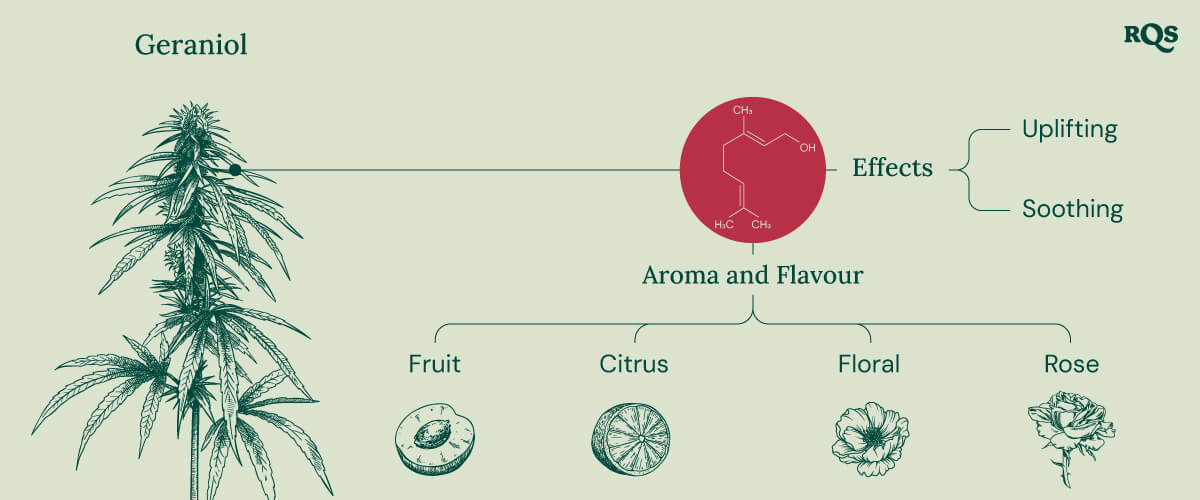
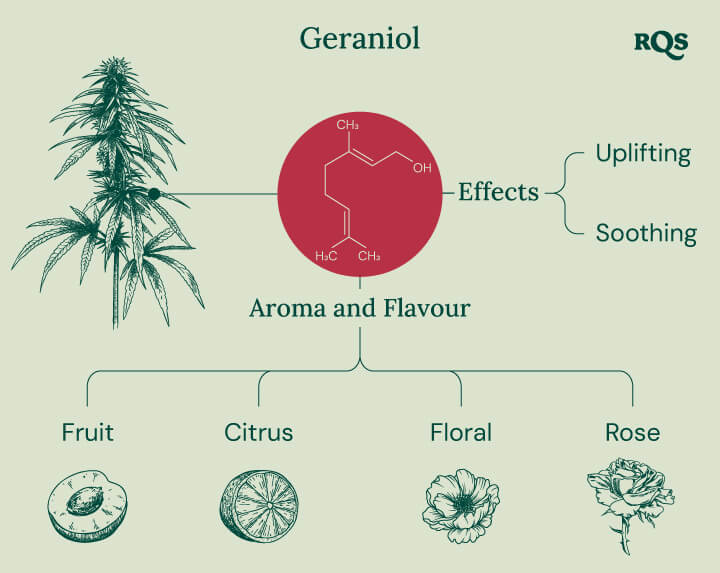
Research Studies on Geraniol
Plenty of research has gone into exploring the potential effects of geraniol, and the findings are interesting (though far from conclusive). Here we explore what we know so far.
-
Geraniol as an Anti-Inflammatory, Antioxidant, and Antibacterial Agent
In 2021, researchers from the School of Laboratory Medicine at Chengdu Medical College in Sichuan, China, tested the effect[4] of geraniol on mice infected with Staphylococcus aureus—the primary culprit of staph infections. To do this, they first infected mice with antibiotic-resistant Staphylococcus aureus before injecting and feeding the animals with high doses of geraniol.
In 2020, Brazilian researchers also explored the antimicrobial properties of geraniol. They reviewed a body of research from 2007–2019 exploring geraniol's effect[5] on Staphylococcus and other bacterial strains.
In 2018, researchers from the International Medical University in Kuala Lumpur, Malaysia, administered geraniol in hopes of combating gastric ulcers and Helicobacter pylori[6] infection in rodents. Meanwhile, researchers in India pitted geraniol against Saccharomyces cerevisiae[7] (a common yeast variety).
-
Geraniol for Heart Health
In 2017, researchers from the Faculty of Medical Sciences at the University of La Plata, Argentina and the Stanford Cardiovascular Institute, USA, observed the effect of geraniol on heart cells[8] exposed to oxidative stress (i.e. an imbalance of free radicals and antioxidants leading to cell damage).
Moreover, in 2014, Brazilian researchers explored the action of geraniol on arrhythmias[9] (i.e. heart rhythm disorders), considered a very serious cardiovascular disease that can require surgical intervention or pharmacological approaches (or both) to treat properly.
-
Geraniol’s Effect on the Liver
As mentioned, geraniol is metabolised in the liver. Hence, its toxicity to liver cells is of great importance and interest to the scientific community. In 2018, researchers from the University of Bologna and the University of Ferrara, Italy, studied the permeation of geraniol[10], its bioavailability, as well as its toxicity on the liver cells of rats.
Besides understanding its bioavailability and liver toxicity, researchers have also explored whether geraniol has any positive effects on the liver. In 2017, for example, Turkish researchers tested the effect of geraniol on rats after hepatectomy[11]. Research from the journal of Alternative Therapies in Health and Medicine found similar results[12].
-
Geraniol and Diabetes
A considerable body of research has explored the influence of geraniol on diabetes, and the results are promising. First and foremost, research published in the journal of Pharmaceutical Biology in 2017 explored geraniol's potential effect on hyperglycemia[13].
Egyptian and Saudi Arabian researchers conducted a similar study on the effect on geraniol on diabetes[14]. This time, the researchers induced diabetes and metabolic syndrome in different groups of rodents and left the animals to develop vascular complications for 10 weeks.
-
How Geraniol Affects Pain and Inflammation
Pain is one of the most common signs that something isn’t right with our bodies. Understanding the way we experience pain and treating it, however, is very complex, and something that researchers continue to explore.
In 2017, the Canadian Journal of Physiology and Pharmacology published a study[15] that explored the progress of rats treated with geraniol six hours after suffering a spinal cord injury.
Furthermore, in 2016, researchers from The Second Hospital of Tangshan, China, conducted a similar study[16]; they induced spinal cord injury in rats through surgery, then treated the rodents with geraniol for 4 weeks.
In 2015, a study published in the European Journal of Pharmacology detailed the effect of geraniol on atherogenesis[17]—a chronic inflammatory condition. The research team leading the study induced atherogenesis in hamsters using a special diet, then treated two groups of hamsters with geraniol. At the end of the study, the animals were killed and their livers, heart, and aorta tissues were analysed.
-
How Does Geraniol Affect Cancer and Tumours?
A growing body of research has sought to determine the effects of geraniol on different types of cancer. In 2018, for example, the journal of the Balkan Union of Oncology published findings from an in vitro study[18] exploring geraniol’s effect on colon cancer cells.
Moreover, in 2017 researchers from Annamalai University in India conducted a study on geraniol's influence[19] on rats with endometrial carcinoma—one of the most common cancers in women.
What Does Geraniol Offer Cannabis Users?
The research studies we’ve covered in this article obviously produced promising results. But what does all this science mean for regular cannabis users?
Unfortunately, it’s hard to say. Though the findings we’ve highlighted here are interesting, they are far from conclusive. Moreover, specific research on geraniol in cannabis is much scarcer. Because cannabis has been prohibited for so long, we are still a long way from understanding the plant’s constituents, how they interact, as well as their effects on the human body.
Unfortunately, cannabis researchers still face many roadblocks that make studying and understanding this ancient plant very difficult. Hopefully, legalization will slowly but surely address these issues and make it easier for our society to study cannabis and unearth its many mysteries.
High-Geraniol Strains
In the meantime, if you’re interested in experiencing the influence of geraniol in cannabis, consider checking out these strains that contain high amounts of the terpene.
-
Purple Punch Auto
Bred from original Purple Punch and an Old Skunk Auto, our Purple Punch Auto produces big, dense, and delicious purple flowers in express time. Sprout these seeds indoors, outdoors, or in a greenhouse and you’ll soon be caring for hardy plants measuring roughly 60–120 cm after their pre-flowering stretch. After 7–8 weeks in bloom (or roughly 10 weeks after germinating your seeds), your Purple Punch Auto plants should be harvest-ready, boasting large, dense flowers with sweet, fruity aromas and up to 19% THC.
Purple Punch Auto
|
|
Purple Punch x Old Skunk Auto |
|
|
350 - 400 gr/m2 |
|
|
60 - 100 cm |
|
|
50 - 55 days |
|
|
THC: Up to 19% |
|
|
Sativa 20%, Indica 75%, Ruderalis 5% |
|
|
80 - 130 gr/plant |
|
|
80 - 120 cm |
|
|
Physically Relaxing |
|
|
65 - 70 days after germination |
-
Alien OG
Love out-of-this-world flavour and aroma? Alien OG is a dispensary-grade OG cross stemming from Alien Kush and Tahoe OG Kush. After 3–4 weeks in veg, Alien OG plants can measure up to 30 cm. Once in bloom, Alien OG will stretch notably, reaching 80–120 cm indoors and up to 180 cm in outdoor environments. After an 8–10-week flowering time, Alien OG plants can be given the chop, yielding long buds with great hybrid structure, sweet citrus, earth, and pine aromas, as well as soothing effects.
Alien OG
|
|
Alien Kush x Tahoe OG Kush |
|
|
450 - 500 gr/m2 |
|
|
80 - 120 cm |
|
|
55 - 65 days |
|
|
THC: Up to 25% |
|
|
Sativa 50% Indica 50% |
|
|
450 - 500 gr/plant |
|
|
140 - 180 cm |
|
|
Early October |
|
|
Calming, Physically Relaxing, Uplifting |
-
Strawberry Cough
Made popular by Kyle Kushman, Strawberry Cough is beloved by every smoker lucky enough to savour her sweet flavours and positive effects. Roughly 75% sativa dominant, Strawberry Cough is fast-growing and resilient. After their pre-flowering stretch, Strawberry Cough plants typically measure 100–150 cm indoors and up to 200 cm outdoors. Then, after 10 weeks in bloom (October outdoors), Strawberry Cough can be harvest-ready, yielding long, bright green flowers with deliciously sweet strawberry aromas and an uplifting, clear-headed buzz that’s ideal for social situations and creative endeavours.
Strawberry Cough
|
|
Strawberry Fields x Haze |
|
|
450 - 500 gr/m2 |
|
|
100 - 150 cm |
|
|
60 - 65 days |
|
|
THC: Up to 20% |
|
|
Sativa 75% Indica 25% |
|
|
600 - 650 gr/plant |
|
|
160 - 200 cm |
|
|
Early October |
|
|
Calming, Motivating , Uplifting |
- One Hundred Faces of Geraniol - PMC https://www.ncbi.nlm.nih.gov
- Terpenes that Activate CB1 - Cannakeys https://cannakeys.com
- Cannabis sativa terpenes are cannabimimetic https://www.ncbi.nlm.nih.gov
- The Inhibitory Efficiencies of Geraniol as an Anti-Inflammatory, Antioxidant, and Antibacterial https://www.tandfonline.com
- Antimicrobial activity of geraniol: an integrative review https://www.tandfonline.com
- Protective activity of geraniol against acetic acid and Helicobacter https://www.ncbi.nlm.nih.gov
- Differential Antifungal Efficiency of Geraniol and Citral https://journals.sagepub.com
- Effect of geraniol on rat cardiomyocytes https://www.scienchttps:
- Geraniol Blocks Calcium and Potassium Channels https://onlinelibrary.wiley.com
- Geraniol Pharmacokinetics, Bioavailability and Its Multiple Effects on the Liver Antioxidant https://www.ncbi.nlm.nih.gov
- The Effect of Geraniol on Liver Regeneration After Hepatectomy in Rats - PubMed https://pubmed.ncbi.nlm.nih.gov
- Determining the Effects of Geraniol on Liver Regeneration Via the Nuclear Factor https://pubmed.ncbi.nlm.nih.gov
- Geraniol, a natural monoterpene, ameliorates hyperglycemia by attenuating the key enzymes https://pubmed.ncbi.nlm.nih.gov
- Geraniol improves the impaired vascular reactivity in diabetes https://www.sciencedirect.com
- Geraniol promotes functional recovery and attenuates neuropathic pain https://pubmed.ncbi.nlm.nih.gov
- Protective effect of geraniol inhibits inflammatory response, oxidative stress and apoptosis in traumatic injury https://pubmed.ncbi.nlm.nih.gov
- Geraniol attenuates fibrosis and exerts anti-inflammatory effects on diet https://pubmed.ncbi.nlm.nih.gov
- Geraniol and geranyl acetate induce potent anticancer effects in colon cancer Colo-205 cells by inducing apoptosi https://pubmed.ncbi.nlm.nih.gov
- Geraniol Inhibits Endometrial Carcinoma via Downregulating Oncogenes and Upregulating Tumour Suppressor Genes - PubMed https://pubmed.ncbi.nlm.nih.gov




































